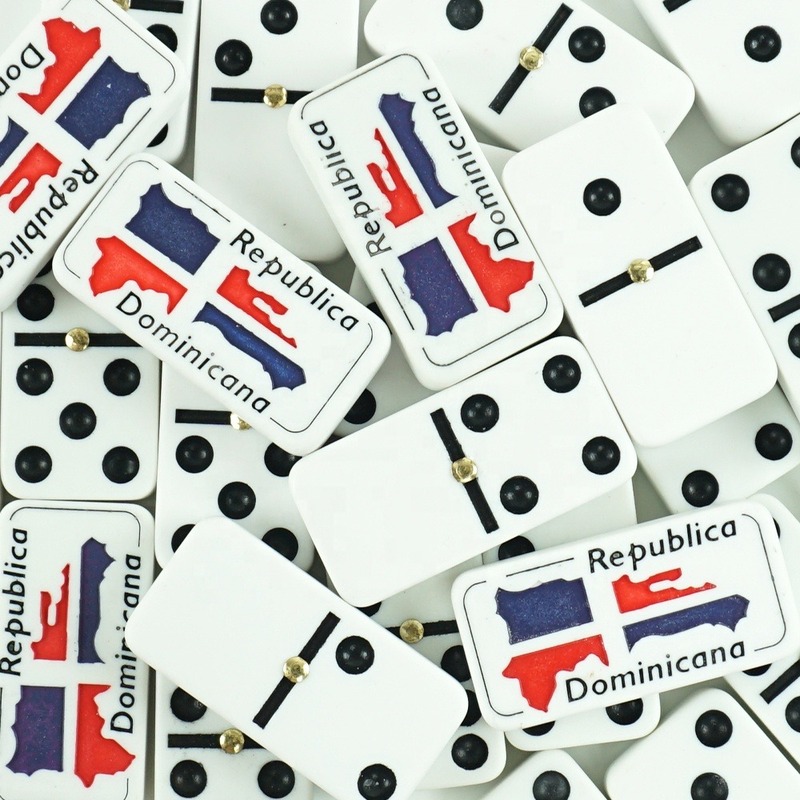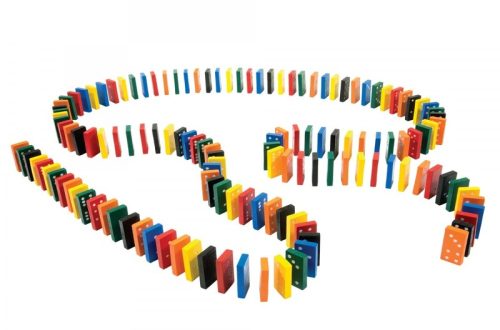The Basic Rules of Dominican Dominoes
Dominican dominoes require strategic play and understanding of the rules. Before diving into the complexities, let’s establish a foundation. Here are the essentials that you need to know:
- The Tiles: Dominican dominoes is played with a double-nine set of 55 tiles. Each player starts with seven tiles.
- The Objective: Your goal is to play all your tiles before your opponents do. Doing this scores points for your team.
- Game Play: The first player places a tile on the board. Others must match the value of the open ends when they play.
- Turns: Play goes clockwise. If you can’t match a tile, you must pass your turn.
- Doubles: A double tile is placed perpendicular to the line of play. This allows two new ends to match on.
- Scoring: Points are scored at the end of each round. The team with the least number of pips on their remaining tiles wins the round.
These rules lay the groundwork for what’s to come. Keep in mind, the game is not only about putting down tiles. It’s about doing so with strategy for maximum effect. This will require looking ahead, counting tiles, and keeping an eye on your opponents’ moves.
Grasping these rules is your first step toward mastering Dominican dominoes. In our following sections, we’ll unfold strategies to take your game up a notch.
Strategy: Developing a Solid Game Plan
To excel in Dominican dominoes, it’s crucial to craft a winning strategy beyond just knowing the rules. A solid game plan in dominican dominoes involves several key tactics:
- Study the Board: Pay attention to the layout of the board. Plan your moves by considering what tiles are in play and predicting what your opponents might hold.
- Hold on to Key Tiles: Keep certain tiles longer to control the game’s pace. Identify which tiles are rare or could be game-changers in future turns.
- Tile Counting: Keep a mental note of the tiles that have been played. This insight can inform your decisions and give you a strategic edge.
- Playing to Your Strengths: Use your strongest tiles to your advantage early on. This puts pressure on the opposition and can create favorable situations for you.
- Adaptability: Be ready to alter your strategy based on the flow of the game. If the initial plan isn’t working, switch up your tactics to stay ahead.
- Bluffing: Sometimes, you may want to trick your opponents into thinking you have a different set of tiles. This can lead to them making mistakes that work to your advantage.
By integrating these elements into your approach, you stand a far better chance of controlling the game and emerging victorious in dominican dominoes. Remember, a strategy is a living plan that should evolve as the game progresses. Stay alert, flexible, and always think a few steps ahead.

Choosing Your Starting Hands
Selecting the right tiles at the beginning can set the tone for dominican dominoes. Your starting hand is vital to developing your strategy. Here is how to choose wisely:
- Balance Your Hand: Aim for a balanced mix of numbers. This prevents getting trapped with unplayable tiles.
- High vs. Low: Consider holding both high and low valued tiles. They can be useful in different phases of the game.
- Double Tiles: These can be both an advantage and a liability. Keep some, but not too many.
- Versatility is Key: Versatile tiles that can play off of multiple numbers are a good bet.
Remember, the tiles you start with influence your game plan. Pick a hand that allows you to adapt and stay competitive throughout the game. Your starting tiles are the foundation for your strategy, so choose them with care.
Scoring and Counting: Maximizing Your Points
In dominican dominoes, scoring isn’t just about fast play; it’s about smart play. To maximize your points and put yourself at a commanding lead, consider these key points:
- Count the Pips: At the end of each round, tally the pips (dots) on your team’s unplayed tiles. The goal is to have the least number of pips. This means that you want to play your high-value tiles first, if possible, so that in case the round ends before you’ve played all your tiles, you’re not stuck with a high score.
- Track Your Opponents’ Hands: Pay attention to your opponents’ moves. Try to figure out which tiles they may be holding. This can give you clues on which tiles to play and which to keep, thus affecting both the scoring and the flow of the game.
- Use Doubles Wisely: Doubles, due to their layout, open up more play options but can also be tricky. Play them at the right moment to avoid getting caught with them if an opponent ends the game suddenly.
- Save Certain Tiles: Some tiles will be more common than others. If you notice that a certain number hasn’t been played much, consider saving a tile with that number for later in the game. It could become a valuable asset.
Mastering scoring and counting in dominican dominoes can significantly turn the tides of the game. So keep these tips in mind and practice them to outmaneuver your opponents and boost your chances of winning.

The Importance of Observing Your Opponents
In Dominican dominoes, keeping a close eye on your opponents is crucial. By observing their moves and behavior, you gain valuable insights that can shape your strategy. Here’s why monitoring your opponents is so important:
- Predict Moves: Watch how others play their tiles. This can help you guess their hand and predict their next move.
- Identify Weaknesses: Notice any hesitations or patterns in play. It might indicate a weakness you can exploit.
- Control the Game: Understanding your opponent’s strategy lets you alter your tactics to control the game’s direction.
- Bluff Detection: Detecting a bluff can prevent you from falling into traps set by skilled opponents.
- Tile Tracking: Keep track of the tiles each player has discarded. It reduces the guessing game of which tiles remain.
- Pressure Points: Apply pressure by playing tiles that you know your opponents can’t match. This might force them to pass and give you an advantage.
Enhancing your observation skills will not only make you a stronger player but also deepen your appreciation for the subtleties of Dominican dominoes. Watch, learn, and use every piece of information to your advantage.
Advanced Tactics: Blocking and Attacking
To excel in Dominican dominoes, mastering advanced tactics such as blocking and attacking is key. Here’s how to incorporate these strategies into your game:
- Block Your Opponents: Focus on hampering your opponents’ moves. Place tiles that force them to draw or pass, stalling their game while you progress.
- Attack with Aggression: Play your strong tiles quickly to stay ahead and pressure opponents. This may limit their options and lead to advantageous situations for you.
- Plan Your Attacks: Identify the best time to play certain tiles, especially ones that others can’t match. By doing this, you can control the flow of the game.
- Counter Blocking: Be alert to block attempts from your rivals. Keep versatile tiles on hand to respond effectively to their strategies.
Utilizing these tactics can significantly affect the outcome of the game. Block and attack wisely to take control and secure your victory in Dominican dominoes. Remember, the best offense is a good defense, and vice versa.

Partner Play: Effective Communication and Coordination
Playing Dominican dominoes with a partner requires good teamwork. To succeed, you and your partner must communicate and coordinate effectively. Here are some tips to enhance your partner play:
- Share a Strategy: Before starting, agree on a basic strategy with your partner. This helps you both to play toward a common goal.
- Non-Verbal Cues: Develop subtle signals to communicate with your partner without words. This can include gestures or body language that only you two understand.
- Play Off Each Other: Be aware of your partner’s moves. Try to set up plays that benefit their hand and vice versa.
- Stay Alert: Pay attention to what your partner is discarding. This will help you make informed decisions about the state of their hand.
- Be Adaptable: If the game takes a turn, be ready to change strategies quickly. Good teams can adapt to any situation.
- Avoid Predictability: While communication is key, be discreet. If opponents catch on to your strategy, they can use it against you.
- Support Each Other: If your partner is in a tough spot, do what you can to help. Play tiles that might give them more options on their next turn.
- Celebrate Successes: When a plan comes together, celebrate it. This builds morale and confidence in your team play.
Dominican dominoes is as much about your relationship with your partner as it is about the game. Work together, stay in sync, and you’ll enjoy both a stronger partnership and better game results.
Essential Etiquette for Dominican Dominoes
To truly excel at Dominican dominoes, understanding the game’s unwritten rules, or etiquette, is just as important as mastering strategies and techniques. Adhering to these standards will not only make the game more enjoyable but also earn you respect as a player. Here are some key aspects of etiquette to keep in mind when playing Dominican dominoes:
- Respect the Queue: Wait your turn to play. Jumping ahead can frustrate others and disrupt the game flow.
- Avoid Distractions: Keep conversations and distractions to a minimum during gameplay. Focus is critical for yourself and your opponents.
- Handle Tiles Carefully: Place your tiles gently on the table. Slamming them can be seen as rude and can damage the tiles.
- Be a Gracious Winner: Winning is great, but bragging about it isn’t. Be humble in victory.
- Accept Defeat Politely: If you lose, show good sportsmanship. Congratulate the winners and avoid making excuses.
- Keep Emotions in Check: Whether you’re winning or losing, stay calm and composed. Strong emotions can affect the game’s atmosphere.
- Respect the Table: Keep the play area clear and treat the dominoes and playing surface with care.
- Play Promptly: Make your moves quickly to keep the game moving. Long delays can be frustrating for others.
Following these etiquette tips will help ensure a pleasant gaming experience for everyone involved in Dominican dominoes. Remember, the game’s spirit is as much about camaraderie and respect as it is about competition.





